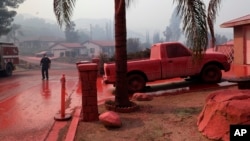While many California residents are working to save their homes from the wildfires that have erupted across the state, many now find they must also work to save their health, endangered by the toxic smoke and other pollutants in the air.
Some people find they are having health concerns they have never experienced before, like shortness of breath, coughing and eye irritations.
Doctors are urging people to wear masks when they venture outdoors, even if they do not live close to a fire. Smoke is hovering over swathes of California, even in areas where there are no nearby fires. The pollutants, embers and fine particulate matter the fires create can easily travel hundreds of miles.
A wildfire in southern California that began Monday grew to 85 square kilometers in size Saturday as firefighters worked to keep the flames from engulfing residential areas in Holy Jim Canyon.
Aircraft have been dumping pink fire retardant on homes in the Lake Elsinore area and other communities in the foothills of Cleveland National Forest while some 20,000 people were under evacuation orders.
A man charged with deliberately starting the Holy Fire, 51-year-old Forrest Clark, appeared in court Friday, but his arraignment was postponed.
Clark made several erratic outbursts during his court appearance. He called the charges against him "a lie" and asked if he could pay immediately the $1 million bail set for his release.
Meanwhile in northern California, the Mendocino Complex Fire, the largest in California history, is 67 percent contained, according to the state firefighting agency Cal Fire. Officials say the fire still threatens about 1,500 homes, down from the 12,000 in its path earlier in the week.
But other fires continue to develop. On Thursday, the Hat Fire started in the Fall River Mills area, 70 miles northeast of the city of Redding. Officials say about 350 residents are under mandatory evacuation orders.
Yosemite National Park spokesman Scott Gediman has announced that the park will reopen on Tuesday after a two-week closure because of fires.
This is shaping up to be one of California's worst years for wildfires. Cal Fire says the state has already spent more than half its annual $442 million firefighting budget since the July 1 start of the fiscal year.





